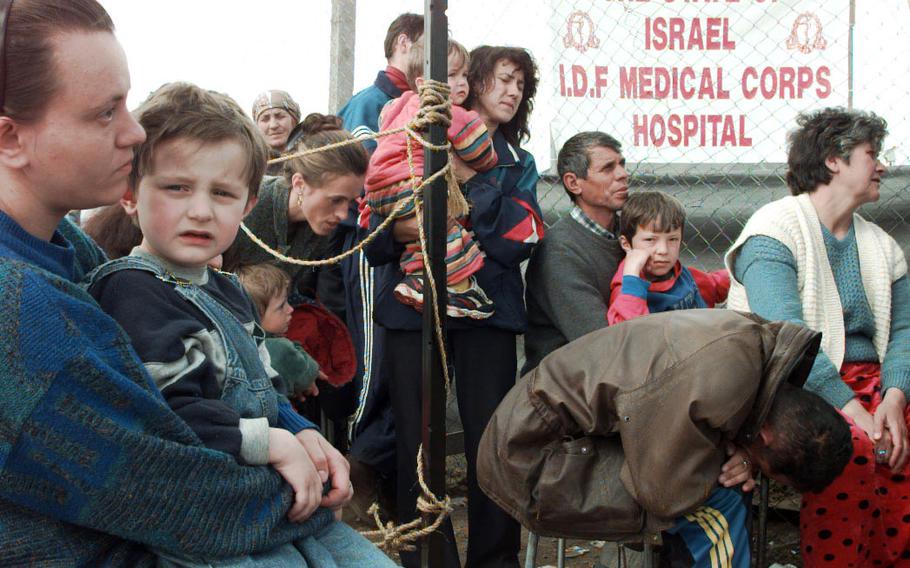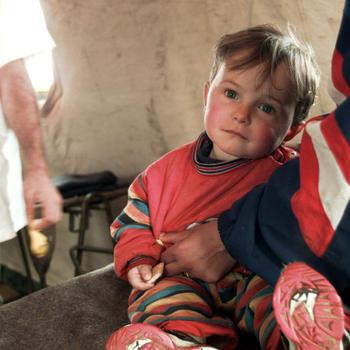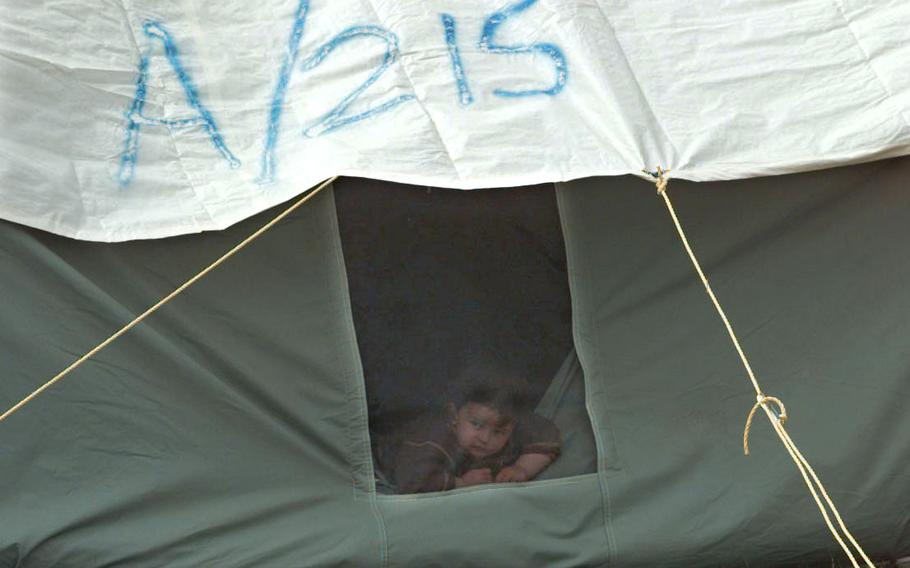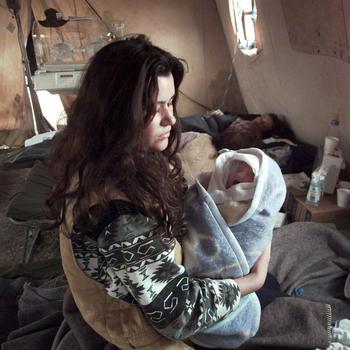
The line is long to receive medical attention at the Israeli Defense Force hospital inside the Brazda Refugee Camp, April 16, 1999. The medical facility consists of tents and have treated approximately 1,200 patients so far. (Ron Alvey/Stars and Stripes)
This article first appeared in the Stars and Stripes Europe edition, Apr. 17, 1999. It is republished unedited in its original form.
BRAZDA REFUGEE CAMP, Macedonia — Medical personnel treating refugees living in the camps here say the general health of those arriving from Kosovo is good.
However, some who have worked in similar humanitarian missions anticipate a rise in emotional problems stemming from the uncertainty refugees feel toward their future.
“People have experienced a lot of trauma, and after living in a camp for a week or more, they become distressed not knowing what, the future will bring,” said Marijke Eppink, a nurse working for Doctors Without Borders in the camp at Brazda.
Officials from the nongovernmental organizations providing health care to the estimated 46,000 refugees in the camps in Macedonia currently are assessing the additional need for psychiatric care.

A young boy is about to be seen by a medical technican (left). He was brought into the medical center of the Israeli Defense Force hospital at the Brazda Refugee Camp, April 14, 1999. The Israel medical facility has treated about 1,200 people so far. There have also been 9 babies born so far in this facility. (Ron Alvey/Stars and Stripes)
Doctors and nurses are seeing a lot of health problems typical in any community. Refugees need medications for chronic diseases such as high blood pressure, diabetes, epilepsy, and heart disease. They have performed a few surgeries and delivered nine babies during the past two weeks at Brazda, the largest of six tent camp for refugees in Macedonia. Occasionally, the doctors treat a broken wrist or sprained ankle, mostly the result of the many soccer games that occupy time for the youth on the camp.
But many of the refugees who come to one of the four medical facilities in the camp are simply looking for a little attention, Eppink said.
“We listen, try to let people speak of their experience and do what we can,” she said.

A young boy peers out the window of tent A/215 at the Brazda refugee camp. The number of refugees changes every day due to the steady stream of incoming refugees and the thousands of refugees that are temporarly going to different countries, but on the day this photo was taken — April 21, 1999 — it was believed to have reached approximately 22,000. (Ron Alvey/Stars and Stripes)
Brazda has more than 25,000 refugees living in the sprawling camp. The German Red Cross is operating a clinic with inpatient and surgical capability; Doctors Without Borders operates two outpatient clinics on the camp.
Israeli soldiers assigned to the fourth medical facility have been working at Brazda since the camp opened. They expect to leave Macedonia in about a week, once aid organizations have fully assumed the medical mission. Leaving comes with mixed emotions from the medical staff, who balance their compassion with policy. NATO is reducing its support of the humanitarian effort as aid organizations come on line with enough personnel and equipment.
“We came here when there was something to do,” said Moshe Efrat, a pediatrician in the Israeli hospital. “There is refugee medicine and (the aid organizations) do that well. But we have had some cases that were a little difficult for them.
“It would be good for me to know that when we leave, there will be someone here to take care of the health problems, It would make leaving a little bit easier.”

A Kosovo refugee tries to comfort her crying newborn baby inside the maternity tent of the Israeli Defense Force hospital. There have been 9 births inside this refugee medical facility, located at the Brazda Refugee camp in Skopje Macedonia. (Ron Alvey/Stars and Stripes)
For now, officials in both organizations say they have enough people and supplies to handle the types of health problems they are treating among refugees.
But with thousands more crossing the border each day, the need might increase. In a press briefing Friday, officials said, approximately 6,000 refugees from Kosovo crossed the border into Macedonia on Thursday. A similar amount was expected again Friday.
Looking for Stars and Stripes’ coverage of the war in Kosovo? Subscribe to Stars and Stripes’ historic newspaper archive! We have digitized our 1948-1999 European and Pacific editions, as well as several of our WWII editions and made them available online through https://starsandstripes.newspaperarchive.com/